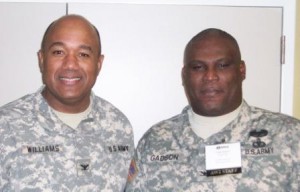By Emily Oehler, WTC Stratcom

COL(P) Darryl Williams, Commander of the Warrior Transition Command (WTC) and COL Greg Gadson, Director of the Army Wounded Warrior Program (AW2) are eager to hear COAD Soldiers’ recommendations for updating warrior care regulations.
Of the 192 Army Wounded Warrior Program (AW2) Soldiers who continued to serve post injury, 30 were at the first AW2 Continue on Active Duty/Continue on Active Reserve (COAD/COAR) Forum opening ceremony in Washington, DC, ready to give the Army a piece of their mind on how to improve antiquated regulations that can’t keep pace with them.
AW2 Director and COAD Soldier COL Greg Gadson told the forum delegates, “We are an elite group and the one thing that binds us is perseverance.” He added that the Army stood up the Warrior Transition Command (WTC) out of its priority for warrior care issues and that, “It’s up to your leadership to make our Army better for those who follow.”
The event delegates are charged with identifying the top issues facing COAD/COAR Soldiers and recommending solutions. Once prioritized, AW2, which provides personalized support for severely wounded, ill, and injured Soldiers to help foster their long-term independence, will be the lead proponent to find solutions and work to update regulations on behalf of WTC.
COL(P) Darryl Williams, WTC commander, told the delegates, “What I bring to this is passion. Passion for Soldiers. It’s what keeps me going.” He urged the Soldiers, “Help me walk with you. Let me know how we can get movement on these issues for you, your Family, and the Soldiers who will follow.”
“The Army is the only service that takes this on in such a structured way–you’re here to add color to it,” Williams added. “I am part of a long line of Soldiers, and now my son serves too. This is important work for the force and I look forward to partnering with you and being your teammate.”
The delegates then jumped into their focus groups to discuss challenges in the following categories: human resources, installation, medical, training, and Veteran affairs. As SSG Jonathan Looney stated, “I’m glad I was chosen to be a COAD Forum delegate–to have a voice and be heard.”


